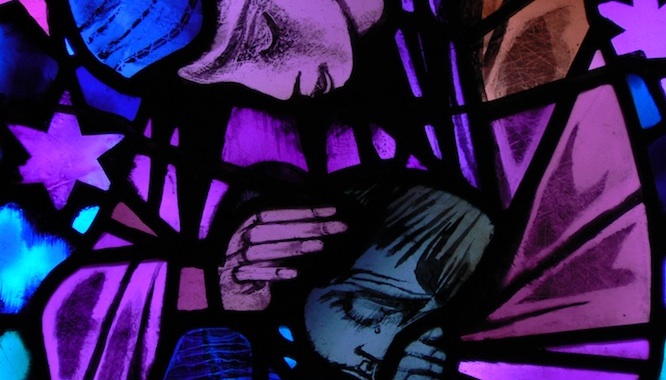The Buddha Forgives
The story goes that the Buddha was sitting under a tree (as he did) with his monks when a man approached and spit on Buddha’s face. He wiped it away and said to the man without anger or offense, “what next?” The man left deeply disturbed; as he was use to receiving inflammatory responses when insulting another. He spent the night agonizing in confusion over the day’s event.
In the morning the man returned to the Buddha, threw himself at the holy teacher’s feet and begged forgiveness. The Buddha said, “For what? The man you spit upon is gone. Men are like rivers changing from moment to moment. The river has flowed much since yesterday and though I may look the same, I am not. Likewise, neither are you the man who came to spit upon me. That man was angry, upset. This man before me bows at my feet, is open, willing. So there is nothing to forgive. Those two men, the one who spit and the one on whom he spit, are no more.”
Why we hurt each other
The Buddha’s words teach us that forgiveness cannot simply be expressed with words. If we are truly to forgive, we must embody this idea. When we act in such a way that requires forgiveness from another, it is not only that we have hurt the other person, but also that we have hurt ourselves.
Take the man in the story. He was confused, and agonized over the hurtful action he had taken. Unknown to the man, the Buddha had forgiven him before he had even acted. What the man truly needed was to forgive himself. You see, whatever the man was experiencing in the moment of transgression was ultimately about him. He probably had heard rumors that this holy man was an atheist, a revolutionary, a defiler and became offended by what he thought he knew. In fact, it was his unwillingness to forgive that led him to transgress.
How often is this case in our own lives? My grandfather once told me, “If you are angry at another person for more than five minutes, chances are it’s not about them. It’s about you.” An unwillingness to forgive often leads to action that requires forgiveness. Because we are hurt, instead of looking inward and accepting that reality, we displace that hurt onto someone else. It’s an ugly cycle, a cycle of unconscious behavior. And it’s crazy, especially in relationships where this can become a never-ending tennis match.
Forgiveness is acceptance
Let’s look at the real issue here. Refusal to forgive someone else is refusal to forgive oneself. Think of what forgiveness entails. It is acceptance. Saying, “it’s OK” suggests that one has come to terms with a hurtful event. This has nothing to do with the other person! It means that I accept it, I’m OK, I can move on. True forgiveness is the ability to sit with pain, to suffer, and to make the decision to accept that pain and not let it define you. It is liberation. And it is strength.
Ghandi said, “The weak can never forgive. Forgiveness is the attribute of the strong.” To look an offender in the eye and honestly say, “I forgive you” is an act of enormous power. And it thrusts one into the eternal present. It says to that other person, “What you’ve done does not change who I am at the core. There is nothing you can do that would change me. I am here and now and can be nowhere and no way else.”
Practice
I urge you today to think about your own life in this light. Are there any actions you’ve taken that merit forgiveness? Are you holding any grudges? Be still. Connect with your breath. Look inward and notice the pain with which you are sitting. Embrace it. Accept it. Forgive yourself.
This is an article dedicated to Bloggers for Peace.
By Terence Stone
If you enjoyed this article and want to get involved, please subscribe to the blog, like us on facebook, and follow us on twitter or Google+.



Matthew 6:14
“For if you forgive others their trespasses, your heavenly Father will also forgive you;”
Thanks so much for the pingback!
Great post…loved it.
You’re very welcome. I enjoyed your article very much 🙂
True. We have to forgive ourselves before we can forgive others. We have to be at peace with ourselves.
Yes indeed.
Reblogged this on 1,2,3 do.
[…] Forgiveness: It’s About You […]
Great post Terence, I adore the Buddha story, simply brilliant. “The man you spat on is gone, and so is the man who spat”
Seeking forgiveness is and forgiving others is a deeply personal thing that takes courage but can bring a lot of peace 🙂
Thanks for sharing!
All the best.
Rohan.
Rohan, thank you for your kind words. I couldn’t agree more. Thanks for reading.
One of the first steps I invite students to take is to take a deep breath. After taking that deep breath, I ask, ‘how are you different and how are you the same.’ Their answer speaks to their level of awareness as well as their marriage to their past.
Every breath I take, I leave who I was to blossom into who I am . . .
That sounds like a very poignant and useful exercise. Thanks for sharing!
[…] written about forgiveness once before wherein I took a very obviously Buddhist perspective on the subject. In that article, there is a […]